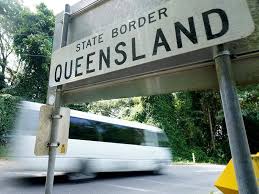Queensland Border Restrictions Fact Sheet – From Queensland Government

Fact sheet: Queensland border restrictions –
what it means for business and industry?
To slow the spread of the novel coronavirus (COVID-19), the Queensland Government is implementing restricted
entry to Queensland from 12:01am on Thursday, 26 March 2020.
These restrictions provide for the continuation of essential goods and services for Queenslanders. Anyone who
arrives in Queensland from another State or Territory from 12.01 am on 26 March 2020, must enter quarantine for
14 days, unless they are an “exempt person” (as defined in the Directive).
Any person who is ordinarily a resident in Queensland is an exempt person.
However, in some circumstances even Queensland residents returning to Queensland will be required to
self-quarantine for a period of 14 days. This includes residents who:
• have been outside the border of Australia in the last 14 days; or
• have travelled in the last 14 days to particular areas of Australia where COVID-19 is spreading in the
community. The particular areas of Australia that require self-quarantine will be decided by the Chief
Health Officer and published on the Queensland Health website.”
Who is an exempt person?
Those living outside of Qld who provide critical services to Qld:
• national/state security
• essential health services
• emergency services
• transport of goods or freight including food
• critical construction, maintenance and/or repair to critical infrastructure in Qld
• construction, mining/energy/agribusinesses (and see below for specific requirements for FIFO workers in
these sectors)
• Any person who in performing their duties is responsible for provision of services for local
passenger transport including bus services, taxi and ride share services, transport or freight is
covered
• federal, state or local government employee worker or contractor who is required to enter Queensland to
perform official duties.
Qld also allows a general compassionate grounds exemption, as well as specific exemptions for those living
outside of Qld who:
• are carers/relatives of dependant individuals in Qld
• need to obtain essential medical treatment including visiting terminally ill relatives in Qld
• are interstate boarding school students where school is closed
• are required to comply with the law to travel to Qld (for example, Family Court, parole/bail conditions etc).
Special exemptions for border communities
• To reflect the unique nature of our border, we have introduced another exemption that allows people who
live interstate near the border but work or study in Qld to continue to travel for that purpose. This is not
restricted to work relating to essential services.
• The exemption only applies if the person does not propose to stay in Qld for longer than reasonably
necessary to attend work.
• The exemption also applies when people living in these border communities travel interstate to obtain
essential goods and services, including to attend school or child care or obtain medical or other essential
services.
Exemptions for FIFO worker
FIFO workers in construction, commercial fishing, mining, petroleum, energy or agribusiness industries are still
allowed to enter Queensland to work without having to undertake self-quarantine.
However, they will be required to provide evidence that they are FIFO workers, who they are working for, and that
they are entering Qld to go directly to work.
The companies they work for in Queensland will also have to provide a health plan that complies with
requirements set by the Chief Health Officer that ensures adequate hygiene and safety requirements to limit the
transmission of COVID19.
For Queensland residents who perform FIFO work for a company interstate, that company does not have to
comply with a health plan set by Chief Health Officer. However if the FIFO work is in a hotspot declared by Chief
Health Officer, the person must self-quarantine on return to Queensland from that.
Will freight and equipment be able to cross the border into Queensland?
Freight and logistics for any goods into Queensland from interstate is still permitted, including retail goods for
pharmacies, grocery stores and petrol stations. on the condition that the person must practise social distancing
wherever possible, including maintaining a distance of at least 1.5 metres where reasonably practicable and
remain isolated in their vehicle or accommodation.
How will the measures be enforced?
Qld police and other emergency officers under the Public Health Act 2005 will be responsible for enforcing the
measures. Other Commonwealth officers may also be involved.
Specific processes apply for those entering through airports, who will be required to provide certain information:
o Personal and contact details
o The address where they intend to stay in Queensland
o Information about where they have travelled in the last 30 days.
In addition to these special requirements for airports, enforcement of these restrictions will apply to roads, rail and
sea ports.
If a person is not exempt from the quarantine requirements but still wants to enter Qld, the enforcement officers will
give them a direction that requires them to stay in a stated place, restrict their movements, restrict contact with
others or other directions as deemed necessary for the 14 day period of quarantine.
If a person fails to comply with the direction/s, an emergency officer may use reasonable force to enforce the
direction.
If the person does not comply with the quarantine directions, penalties will apply: $13,345 for individuals and
$66,672.50 for corporations. It is possible the enforcement officer can issue on the spot tickets of $1334.50 or
$6,672.50 for corporations.
For more information visit www.qld.gov.au

